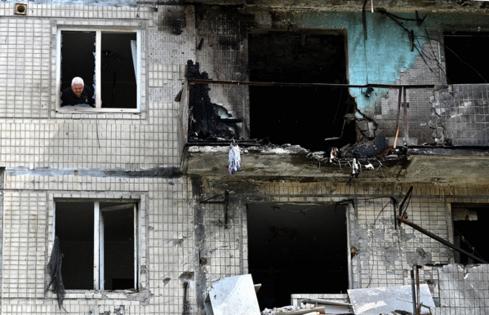Editorial: Now is the moment to pressure Putin, not appease him
Published in Op Eds
From Istanbul to the Vatican to the Oval Office, everyone seems to want peace in Ukraine — except Vladimir Putin. The Kremlin says it prefers to end the brutal war it launched in 2022 through “political and diplomatic means,” but that’s like a pickpocket claiming to prefer charity: The bluff only works if others fall for it. Ukraine’s Western allies shouldn’t.
Putin’s actions hardly suggest he is looking to end the fighting. A two-hour call with the White House last week yielded only vague promises from the Russian president — followed by several days of some of the fiercest drone and missile strikes against Ukraine since the war began. Meanwhile, Russia’s summer offensive seems to have begun. Satellite images suggest it is also improving its positions along the border of Finland, a member of the North Atlantic Treaty Organization, and tightening its military integration with ally Belarus.
At the same time, Russia’s position is fragile. Its forces are suffering atrocious casualties to make incremental territorial gains. At home, fiscal buffers are thinning dangerously. Oil and gas revenues fell 12% year-on-year in April, according to finance ministry figures. Urals dropped below $50 per barrel in April and remains well under the nearly $70 assumed in the federal budget. With almost 40% of government spending going to defense, the Kremlin is draining its National Wealth Fund to plug gaps. The latter is down to $30 billion in liquid assets.
To change Putin’s calculus, the U.S. and Europe will have to ensure the costs of the war outweigh its benefits.
While the U.S. has been disinclined to levy additional sanctions on Russia, patience may be running low. The most effective way to gain leverage against Putin would be to lower the Group of Seven price cap on Russian oil exports as European nations are proposing — and enforce it. Every $10 drop in the oil price shaves an estimated half a percentage point off Russian gross domestic product, depriving the Kremlin of billions of dollars in budget revenues.
Europe can do more on its own as well to keep Ukraine in the fight, in two principal ways. First, it can ramp up economic pressure by more vigorously enforcing all existing sanctions and further curtailing purchases of Russian fossil fuels (the European Union was the fourth-largest buyer in April). Better yet, the bloc should expand sanctions to include banks, refineries and other entities that support Russia’s illicit trade.
Second, European governments can expand their military support for Ukraine. That includes providing more funding for the country’s growing arms industry, transferring more materiel from European stocks — including the long-range Taurus missiles Germany has been reluctant to offer, but also more artillery, air defenses and tanks — and training more Ukrainian recruits. NATO leaders must press the U.S. to continue supplying intelligence and allowing the re-export of U.S.-purchased weapons.
For their part, well-wishers in Congress should remind the White House how dangerous it would be to disengage entirely. General Christopher Cavoli, NATO’s commander, told Congress in April that Moscow has deployed more than 600,000 troops in Ukraine — nearly twice the original invasion force — and is racing to build the 1.5 million-strong army Putin has decreed. It is also on track to accumulate an artillery stockpile three times the combined production of the U.S. and Europe.
An emboldened and war-hardened Russia will endanger Europe, strengthen China and undermine America’s strategic position globally. A bipartisan bill with 80 cosponsors in the Senate includes a 500% tariff on imports from countries buying Russian energy exports. If the administration really wants to bring peace, it should consider letting some version of the legislation go ahead — and calling Putin’s cynical bluff.
____
The Editorial Board publishes the views of the editors across a range of national and global affairs.
©2025 Bloomberg L.P. Visit bloomberg.com/opinion. Distributed by Tribune Content Agency, LLC.

























































Comments